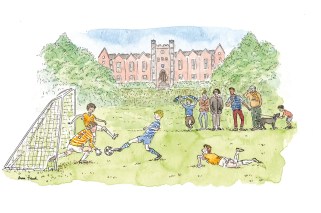Ever since Donald Trump’s now-infamous phone conversation with Vladimir Putin last month, Russia has been buzzing with speculation that Western companies which left the country after the 2022 invasion, especially US ones, will be returning. For some, this is a dream, for others a nightmare. Either way, it seems to be an overblown prospect fuelled by a refusal to accept just how toxic the Russian market will be for the foreseeable future.
Under the headline ‘Now Hello Again? How American Companies Will Return to Russia,’ the popular tabloid Moskovsky Komsomolets yesterday confidently asserted that ‘American business wants to return to Russia, but now the game will be played by Russian rules’. For different reasons, hawks, doves, protectionists and liberals have all been singing the same tune.
What the Kremlin giveth (back), it can just as easily take away again
For the foreign policy doves, it is an attempt to encourage Putin to take the present opportunity to find some way of ending the war in Ukraine and thus sanctions. With Putin now so comprehensively isolated from the technocrats and business class, getting into his daily press cuttings is one of the relatively few ways most of them have of being able to influence the President.
Conversely, the hawks, eager to head off any such campaign in favour of potential concessions, are painting a picture in which a weak-willed Russian people can be bought off with the promise of the return of foreign brands. They point to the success of copycat businesses which have taken over abandoned niches – the ‘Tasty. Full Stop’ franchise in McDonald’s place, the oh-so-subtly named ‘Stars Coffee’ and so on. But they also warn that any progress made in ‘import substitution’ would be wasted if the rapacious foreign multinationals are let back in.
This is in many ways the concern of the protectionists, not least those companies that benefit from the absence of foreign competition. This can bring together odd bedfellows. At last week’s parliamentary session for the Prime Minister’s annual report, the ultra-nationalist Liberal Democrats and the New People faction, which by the standards of Russian politics can be considered socially liberal, were united in opposing letting the foreigners back with undue haste.
Businessman Alexei Nechayev, leader of the New People, warned that ‘what can really hinder our development is the return of Western companies… We need to protect our own.’ In his view, ‘the policy is very simple. If there is benefit for Russia from the company, let it work; if we ourselves do what it does no worse, then goodbye.’
There is an equally odd alliance on the other side, as those arguing for an early reopening of the Russian market include both genuine liberals and, more quietly, also some of the big oil and gas corporations. They are, of course, driven by self-interest, hoping that Western companies can be brought back to Russia, but under sharp limits that mean they can provide the technology and investment they need as junior partners.
So far, the Kremlin is inclined to a careful and limited re-opening. Putin told a meeting of the Russian Union of Industrialists and Entrepreneurs that there would be a process whereby companies which minimised their withdrawal or did so under the pressure of their governments would be given priority access, along with companies providing goods or services otherwise unavailable in the country.
However, it will take more than the Kremlin’s gracious permission to lure major Western players back. It remains a high risk: what the Kremlin giveth (back), it can just as easily take away again. The prospect of being forced into joint ventures as a junior partner is often not going to appeal, especially as the experiences of so many Western companies strong-armed by their local partners into essentially giving up on their investments are still fresh in institutional memories.
This also presupposes that foreign governments will let them return to Russia. If and when there is any sanctions relief, it is likely to be staged and limited. The strategic sectors Moscow is most interested in opening up – oil and gas, not fast food and sportswear – are likely to be held until last, if at all. Likewise, it is likely to be a long time before Visa and Mastercard make it back to Russia.
This is, then, an expression of hope in Russia that one way or another a normalisation of political and economic relations may be coming. This is likely to be over-optimistic, but that is not just on the Russians’ part. In 2022, I provided some guidance for an American company that was trying to negotiate its way out of the Russian market. Last week they got in touch again: ‘This is just some preliminary horizon-scanning, but we’d like to talk about the circumstances in which we could get back to Russia.’








Comments